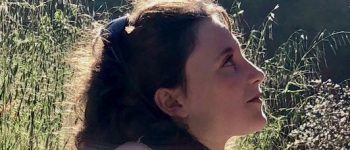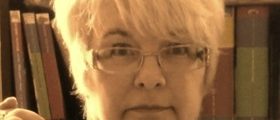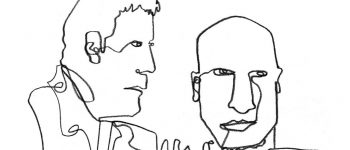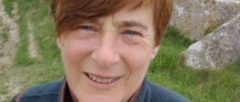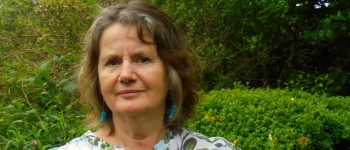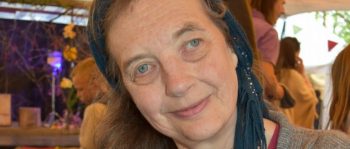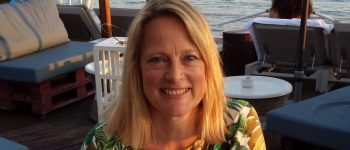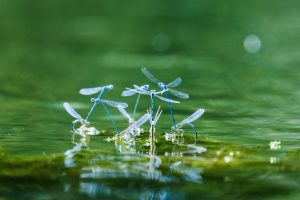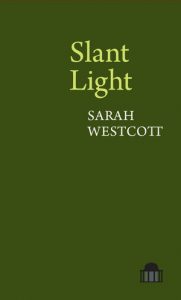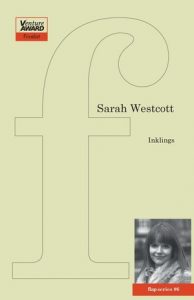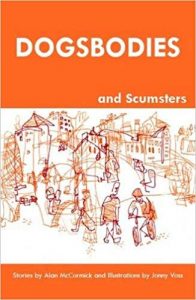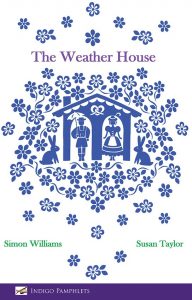Streams
poems and stories
scroll down to read poems and stories in our
Spring Issue
growing weekly from March to June 2019
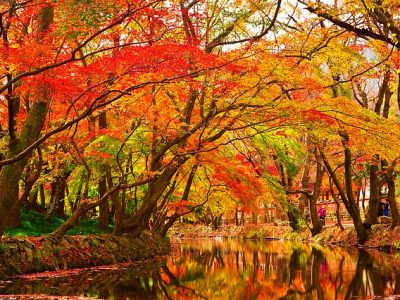
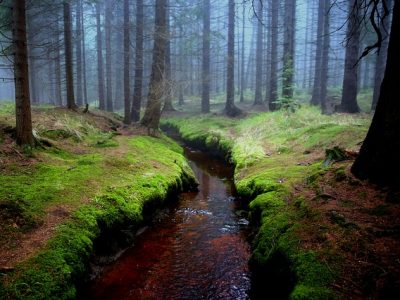
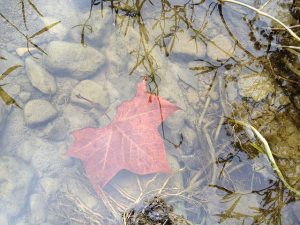
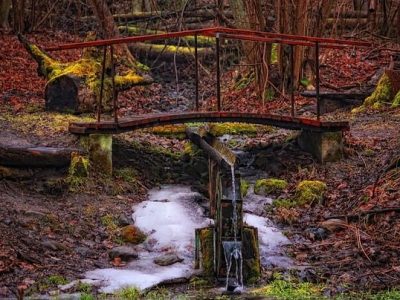
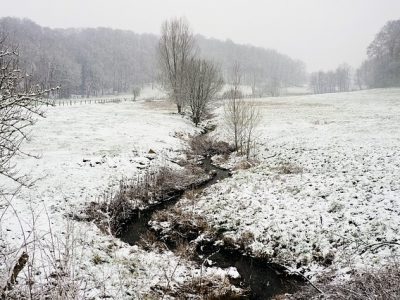
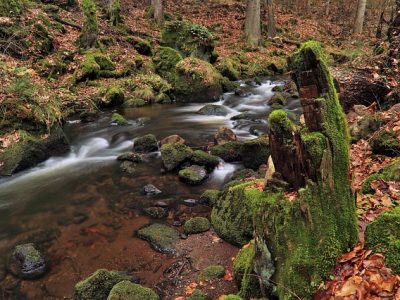
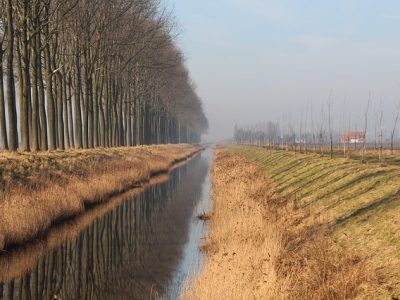
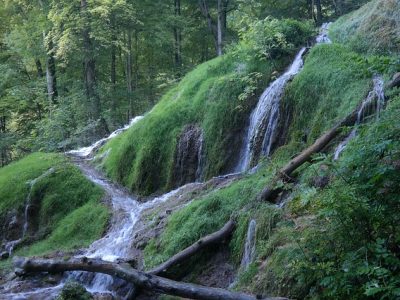
Streams
our first poem, on the first day of Spring, is by Sarah Westcott

Sarah Westcott is a freelance writer and former journalist, currently working as poetry tutor at City Lit in London. Her first collection Slant Light, published by Pavilion Poetry, was Highly Commended in the 2017 Forward Prizes and she is working very slowly towards her next book. Her pamphlet Inklings was a Poetry Book Society choice. Her poems have appeared in magazines including Poetry Review, POEM and Magma, on beermats, billboards and the side of buses, and in anthologies including Best British Poetry. Recent awards are first prize in the London Magazine poetry prize and the Manchester Cathedral poetry prize. Sarah grew up in north Devon, on the edge of Exmoor, and lives in Kent with her family. https://www.sarahwestcott.co.uk
Sarah Westcott – Filthy Little Stream
Filthy Little Stream
water~ ~~~~~~~~ needling
some reach towards majesty
frivolity of bubbles chemical sickness
long wet vocal cord opening —
smoother the lee; curling under tree roots, undermining,
something thrown down
to glint its way out
some formality in the stitch-work
turning itself over, like digestion,
inspecting its soft under-parts
a sputtering flow brick–jagged
unloved and unlocked this segment
rolls and pools where drains run in like sores
dark grey dark grey as tarmac or slate
a narrative of itself in the junking
some faith in the blackthorn
that strays so close,
the darkling thrush gunning for song –
Sarah Westcott
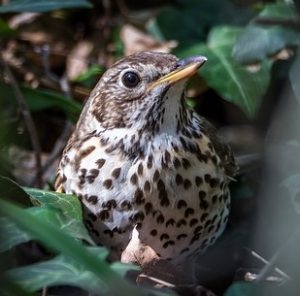
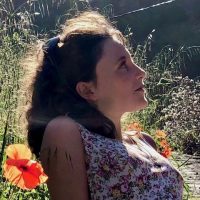
Thirteen-year-old Ide Crawford has won the Betjeman Poetry Prize 2018 and the Alan Garner Writing Competition 2016, and has been shortlisted for the Young Walter Scott Prize. She is Poet Laureate of St. Pancras Station. She is currently working with the Blacken Trust to set up an open project exploring the way creative writing can be rooted in locale. She writes prose as well as poetry and has recently completed a children’s time-slip novel exploring the secret history of two mysterious places. Ide’s favourite things are sunsets, twisted tree trunks, thunderstorms, snowdrifts, and dusty books. She tweets about nature and folklore at @mytangledgarden.
Ide Crawford – Song of the Naiad
Song of the Naiad
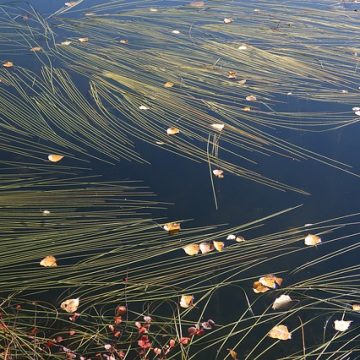
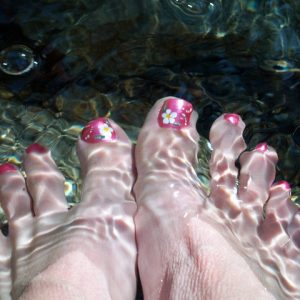
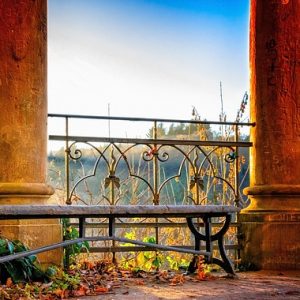
We sing our song of rise-rush-ring and spiral-sweep-spill
Of dip-down-ripple and fast flow-fill
Of wept water and whispering weed
Of sound-smooth rocks and silver speed
Of moss-fold and light-fold and shade-fold
Of tingling toes and cutting crisp call cold
Of bright bends and bubbles and broken-blue
Of sweet-sun-shafts that go tumbling through
Of stream-curve-carved seats
Of cold-quickened heartbeats
Of races where water is winning
Of sky-snatches spinning
Of on-rush, down-pull
Fast and full
Down-pull
Rise-rush-ring, spiral-sweep-spill, dip-down-ripple, fast flow-fill
Tingling toes, broken-blue, sweet-sun-shafts, spiral-sweep-spill
Weed, wept-water, crisp-call cold, silver speed, fast flow-fill
Fill, flow, fast flow-fill, ripple-down, sweep-spiral, dip – spill
We sing our song of all this, and more,
From the stream will this music pour
From the stream this music thrill
The music of water-spill and heart-fill
Water-spill, heart-fill
Ide Crawford

Jeffrey Yamaguchi creates projects with words, photos, and video as art explorations, as well as through his work in the publishing industry.
Jeffrey Yamaguchi – Lone Tree on Abandoned Pier
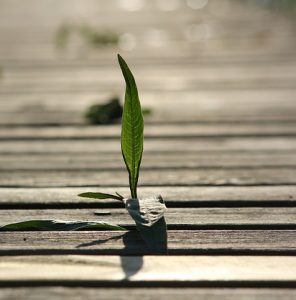
Lone Tree on Abandoned Pier
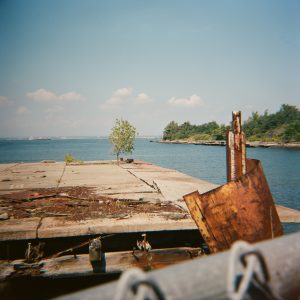
Edge of the city
lone tree on abandoned pier
layered in the dust
of rusted out nails
outlasting the sun
the splinters of crumbling wood
cast off a final message:
roots will find a way
Jeffrey Yamaguchi

Sue Spiers is British Mensa’s SIG Sec for Poetry and her first collection is called Jiggle Sac. Her poems have appeared in Acumen, Dream Catcher, South Bank Poetry, among others, and online at inksweatandtears.co.uk and thelakepoetry.co.uk. Her work has been included in the Bloodaxe anthology Hallelujah for 50ft Women and in the Paper Swans Press anthology Best of British.
Sue Spiers – Droplets
Droplets
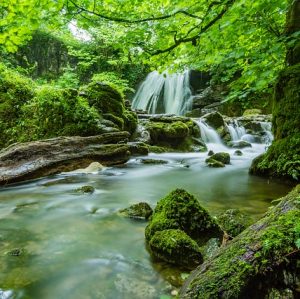
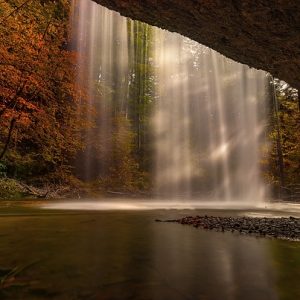

What is the language of water
with no mouth, no larynx, no tongue?
Does water speak?
Does a stream sing?
Each note struck on rocks,
like a xylophone of stones.
Does a waterfall guffaw?
Transmitting the joke down,
fall about, laugh like a drain.
Does rain gossip?
Spread its tittle-tattle, spit spittle
at breeze’s rumour through corn.
Does the sea show anger?
Thumping waves, crashing breakers,
churning undercurrent?
Does a lake convey stoicism?
Silent shifts of depth,
reply, ‘nothing’s wrong,’
when you know it is.
Sue Spiers
First published in Obsessed With Pipework #82

Carol Parris Krauss is a mother, poet, and teacher from the Tidewater region of Virginia. She was recently honoured by the University of Virginia Press as a 2018 Best New Poet. Her work can be found online and in print in Amsterdam Quarterly, Storysouth, and Poetry24 amongst others. She enjoys American college football, gardening, and her many pets.
Carol Krauss – The Drought
The Drought

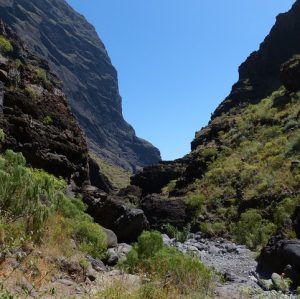
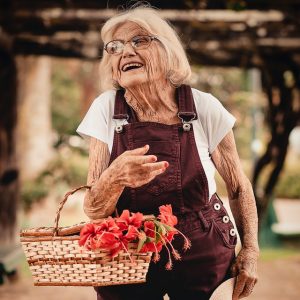
Long ago father led me, all train trestle legs and elbows,
through Pisgah Forest on a day hike.
Near the turkey brush and mountain laurel, a hook, a tiny crook
of Pisgah River had run dry.
Cracked and segmented from lack of God’s grace,Momma said.
We walked the parched branch past
Farlow Gap, beneath a parasol of Pignut Hickory
and Scarlet Oak trees.
I’m still all elbows, legs. My skin a segmented, dried out
creek bed. Age spots, like river rocks, lifting on the edges,
scatter about hook and crook, marking my time in the sun. The
drought of God’s grace.
Carol Krauss

Sarah Westcott is a freelance writer and former journalist, currently working as poetry tutor at City Lit in London. Her first collection Slant Light, published by Pavilion Poetry, was Highly Commended in the 2017 Forward Prizes and she is working very slowly towards her next book. Her pamphlet Inklings was a Poetry Book Society choice. Her poems have appeared in magazines including Poetry Review, POEM and Magma, on beermats, billboards and the side of buses, and in anthologies including Best British Poetry. Recent awards are first prize in the London Magazine poetry prize and the Manchester Cathedral poetry prize. Sarah grew up in north Devon, on the edge of Exmoor, and lives in Kent with her family. https://www.sarahwestcott.co.uk
Sarah Westcott – Mayfly Rising
Mayfly Rising
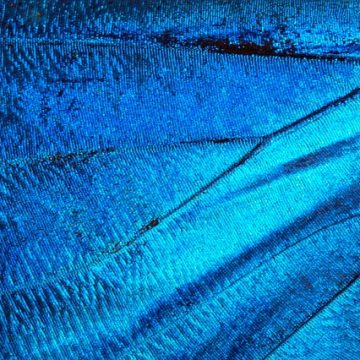
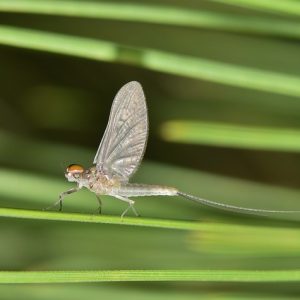
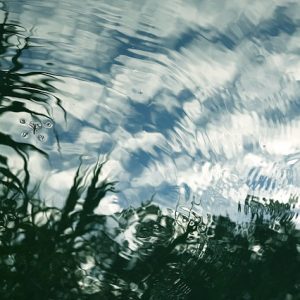
I dreamt of air’s blue space
I swelled and sank in silt
I dreamt of wings folding and rising
I knew there was more
I knew the glory of reaching into my body
to pull out fineries, silks,
my delicate whisks
I was naiad and I knew
life would fan into a single haloed day of brightness
the air tinny and friable,
that I would fly on the narrowest silver threads
between the river bed and heavens
where I am written of.
That I am called imago.
*
I spin between earth and heaven
my guts are filled with air
my mouth is sealed
I trail eggs like falling suns
dip to the water’s skin
and bend my face to its coolness
I am burning myself out with beauty
I cannot bear
my body is diatom pellicle
my limbs threads
*
Light falls through the weed
river is mother, father, blood-mouth, mind
rising towards comprehension —
Sarah Westcott
First published in Nature & Sentience, Corbel Stone Press, 2017.
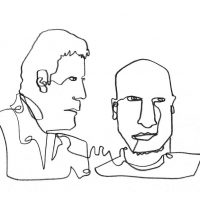
Alan McCormick lives with his family by the sea in Dorset. He has been writer in residence at Kingston University’s Writing School and for the charity, InterAct Stroke Support. His fiction has won prizes and been widely published, including Salt’s Best British Short Stories, The Sunday Express Magazine and Confingo.
He also collaborates with the artist Jonny Voss, where their work featured regularly on 3:AM Magazine. ‘Reasons to Swim Inside the Sky’ comes from their book, Dogsbodies and Scumsters, which was long-listed for the 2012 Edge Hill Prize.
See more at: www.dogsbodiesandscumsters.wordpress.com.
Jonny’s work can be found at www.jonnyvoss.com and www.jonnyvossart.blogspot.com
Alan McCormick – Reasons to Swim Inside the Sky
Art by Jonny Voss
Reasons to Swim Inside the Sky
Alan McCormick
The canals of upper Clapton are mustard smelling trenches of blink-and-you-miss-it spasm splatters of colour amidst tar dark pathways. Bushes bristle with broken bottle leaves, mottle cast in a sullen, diesel pallor. Warrens snake under daisy field enclosures, as rabbits jump up into patchworks of butterfly pastures in green shield stamp grasslands. Silence only broken by the magnetic hum of telegraph wires slung from giant cranes, barbing and scratching the clouds in criss-cross lines: steely map gradients for a slate grey sky.
A mugger’s paradise – yellow raven’s eyes peep through black balaclava pillbox heads, bronchial and hoarse against the damp thin wool – lone men lurking in barbwire crevices, torsos immersed in the marshy reed vines, aqualungs of bile and blood coursing from their veins. Punctuating a walk along the bank are police notices with fish and chip paper headlines – uptight black letters stuck like calcified felt on crude yellow metal boards – milestone millstones chronicling acts of predatory violence.
Barges rest up along the River Lea decorated in Nepalese colours – mud reds, indigo and ochre. A local pub by a redbrick council estate spills people out into the early summer evening. Misplaced pudding-faced walkers, urban and ashen skinned, clutch their pints and look out to wide savannahs of wire sharp grass that grow beyond the swamp reeds of a still distant marshland. Chewing the crisp packet fat over memories of long distance walks: exaggerated escapes from concrete chokey and unlikely fishing exploits and tips swapped and passed on: ‘put Perrier in this canal and you could oxygenate the dead.’ Fish rise like aquiline Christs from sunken tramways set beneath the fine silt bed. As if on cue, a salmon with a display of temper cruises by, belly up, rung free from its cellophane tomb wrap (courtesy of the local Tesco Superstore) – a smile of slash gut, a grinning fish coyote, its scaly skin shimmering silver and purples amongst the petrol whirl-wash of slow moving water.
You’re as likely to see a discarded shopping trolley or a deserted desert boot as any living being float upon this surface; but there are lovers here. Lone couples circle in the fringes, promenading the mud banks. Held close on one side by the claustrophobic, crumbling outskirts of the city and on the other by fields of secret kisses calling, blush tinged in the spreading sunset – the promised melt of soft lips joined. They walk in twos like swooning Bobbies on the beat; their fingers interweaved behind their backs. Dusk is their time to take the air, now momentarily sweet, before the sun floats down to disappear and the evening draws in and closes out the light.
Swans form couples too, but one swims alone: Tony, named after a long-necked former defender of these parts, Tony Adams. He moves with a ferocious glandular reputation to live up to; encased in a brick-hard armour of snow pelt, he hisses like a tomcat if you get too close.
Downriver on the bank, the famous Dalston Heron poses on stilt-like old man’s legs. He is as still as night and cranes his telescopic neck and haughtily gives the eye, his calm shape-shifting in the shadows, his presence benign and balanced, somehow comforting. But a raucous bellow of noise comes from a pub and he takes his uptight walk and moves away.
A group of red faces nestled together on pint filled tables jab their tongues and shout out the odds. And from there comes a small boy, escaping his drunken mother’s shackles, emerging between heavy adult legs, and rubbing at his eyes. He moves towards the heron, which stands quietly by a wall, its feathers blurring in the breeze. The boy reaches out with his hands and the heron lays his long, red bill gently on the boy’s shoulder. And they find a space, air cuddled in between, and slowly rock: a melancholic waltz. From the aggravated throng splinters a shard of angular spite: ‘Sean, where the fuck are you?’
Bobbing close by, like a small balsa wood boat, is a protective coot who blows his tiny soul trumpet through a Burger King straw – Zoot the Coot, whose shrill call-melody seems to rest on the woman’s pitch each time she cries out. ‘Sean!’; blast of coot; ‘Fucking hell, Sean!’; more blast of coot until the boy and the heron are suddenly gone, and all is quiet again.
In a park, a small red vixen slinks into the bushes where her family waits. The moon passes shadows and light between the clouds, as the night rolls softly on the velvety, ebbing sheen of the canal. And there, high on the grass, are the boy and the heron – suddenly lit, finding places to hide and spotlights of moon dust to play and emerge into. The heron is watchful, standing proud, as the boy runs down a slope, his arms flapping through the air.

Peter Burrows is a librarian in the North West of England. After recently starting to write again his poems have appeared in The North; The Interpreter’s House; Ink, Sweat and Tears and other journals, and most recently in Coast to Coast to Coast; Marble Poetry; The Curlew; Dodging the Rain; Dream Catcher; Northwords Now and shortlisted in The Hedgehog Press Cupid’s Arrow Love Competition.
peterburrowspoetry.wordpress.com
Spring by Peter Burrows
Spring
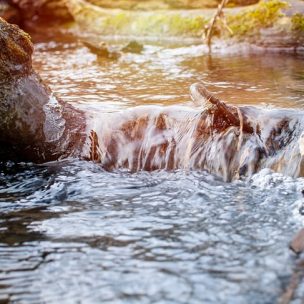
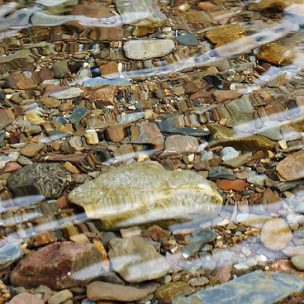
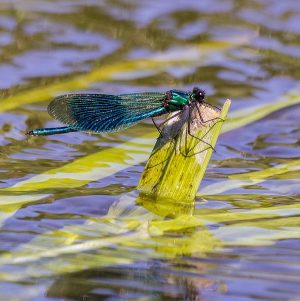
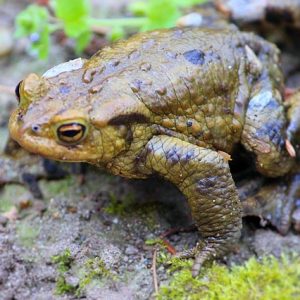
Sourcing its descent
slinking across sloping track
meltwaters headwaters bubbling fresh
swell and overflow the leafy stone trough
this running spill almost invisible
dashripples splits as outstretched fingers
spread
ambles aside runs
back in
a dog lick a light slick
trickling mirage
fizzing tyres unseen
softly scours
shifts grit tumbles gravel
mudsplashes rock
gently gouges tracks
insects leaves debris
caught helpless
eddy its wet-eyed pools
each year hatched toads
hundreds upon hundreds
ford its wet plains deltas that hold
delay as thought charged swirling before
once more drop chases drop
fast past its surrounds relaid tracks
adjacent farm
channels divines senses in unison
its undeniable descent escapes
under gate down grassy cascades
culverts awash
flushing the lush field’s brook
just before the Limey’s flow
continues
its endless course
Peter Burrows
Sweeping the Sands by Peter Burrows

Susan Taylor began writing in her teens in the idyllic setting of her family farm in the Lincolnshire Wolds – Tennyson country. An ex-shepherd, she has become rather a turncoat now, with much sympathy for the plight of the wild wolf. She has seven published poetry collections, including Temporal Bones, published by Oversteps Books in July 2106.
Susan is a keen performer of her poetry and has developed and toured many collaborative poetry shows, including La Loba – Enchanting the Wild and The Weather House, which appeared as an Indigo Dreams Poetry Pamphlet in 2017.
No Waters More Clear by Susan Taylor
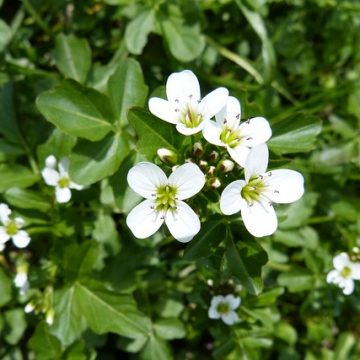
No Waters More Clear
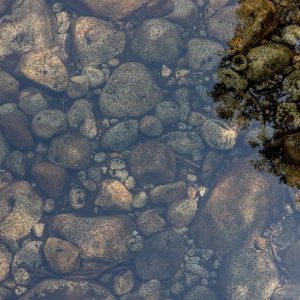
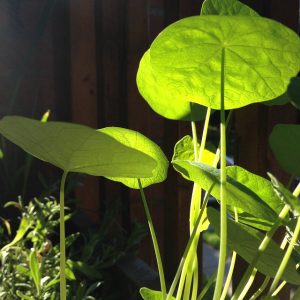
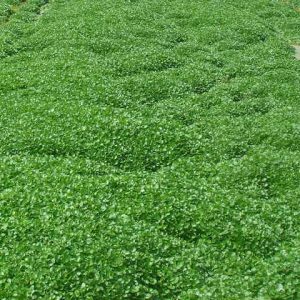
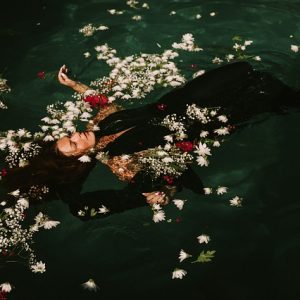
I am stretched out in a bed of grief.
Green as watercress, it is.
I can feel the love of ones that love me
supporting me all around,
holding me,
like the water beneath the fronds
flowing through them constantly.
So here I am
able to shed these soft word seeds
among dark curling leaves of pain,
so fresh and tender that I begin
to understand more
the nature of bereavement. It is a spring
renewing itself from deep down.
The worst of losses has come into my life:
the loss of a child, loved and so loving,
young and so strong. He was taken
on impact by a freakish hurling force,
a race against time
in some stranger’s life.
Let there be no more race against time
for me. Time drifts on a bed of watercress.
There’s no waters more clear than here
in the quietest part of the stream
where cresses grow. During days
when I am stretched out floating,
too stricken for tears, these words
shed my freshwater grief.
Susan Taylor

Sharon Phillips retired from her job as Principal of a sixth form college in 2015. Since then, she has been learning to write poetry again, after a break of 40 years. Many of her poems celebrate the beauty of the Isle of Portland, where she lives with her husband. Recent poems have been published in Three Drops from a Cauldron and Atrium and are forthcoming in The High Window.
Reflections, Upwey by Sharon Phillips
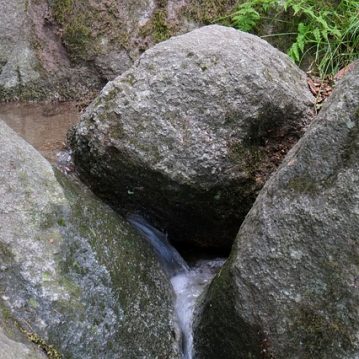
Reflections, Upwey
After M.C. Escher
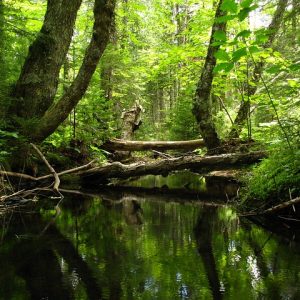
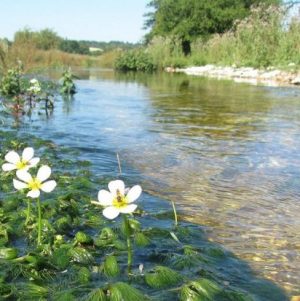
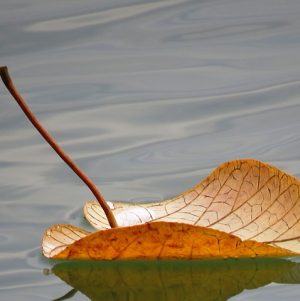
headwaters seep
from chalk downs
through limestone,
spill from the rock
springflow a thin glaze
on a sandy bed
purls downstream
pools deep under trees
crowsfoot, moss
and watercress
thread the crowns
of hazel and ash
leaf-fall floats yellow
on pearl-grey cloud.
Sharon Phillips
Three Poems by Sharon Phillips

Kerry Darbishire, songwriter and poet, grew up in the Lake District where she continues to live, find inspiration and write in a wild area of Cumbria. Her poems have appeared widely in anthologies and magazines and have won or been listed in several competitions, including the Bridport shortlist 2017, and the 2018 PBS Mslexia Poetry Competition. Her first poetry collection, A Lift of Wings, was published in 2014 by Indigo Dreams. A biography, Kay’s Ark, the story of her mother, was published in 2016 by Handstand Press. www.handstandpress.net. Her second poetry collection, Sweet on my Tongue, was published by Indigo Dreams in 2018 and is a finalist in the Cumbria Culture Awards 2019. She co-edited the new Handstand Press Cumbrian Poetry Anthology, This Place I know. Kerry is currently working on a pamphlet and a new full collection.
Beck Moss by Kerry Darbishire
Beck Moss
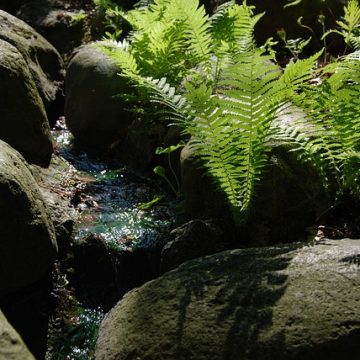
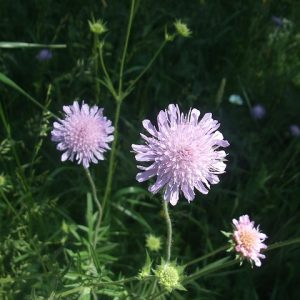
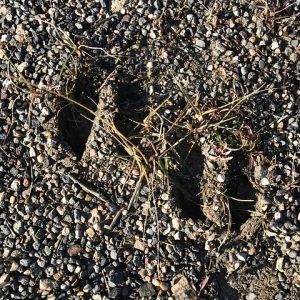
Saunter the path wool-soft
haunch-wide
ferns thistle water mint
pressed aside
by heron fox deer
footprints mired fresh
to mud like fossils bedded in rock
Follow the rill
down to a whisper
the lightest cloth
thrown
over the day
the way
sedge warblers and damsels dance
wings-a-blur
through scots pines
lime-smirred larch
bowing to the lapis blue
of devil’s-bit scabious
sleet grass seeds
and butterflies
buried in thickets
of bog myrtle
and reeds
waist-deep fidgeting
for release
from the anchor
of winter
Kerry Darbishire
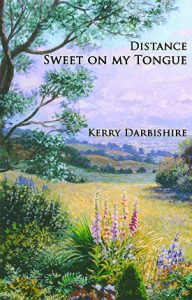

Andrew Cochrane was born in Germany and grew up in various places throughout England, Germany and Cyprus. He lives in Southampton where he is a PhD research student at the university, writing a fragmented novel about the grieving process across cultures. His work has appeared in Litro, Postcard Shorts, Every Day Fiction and Kerouac’s Dog, among others.
A Stream in the Woods by Andrew Cochrane
A Stream in the Woods
If a river is a dream then a stream is a doze, he said, the man in his wellies fetching the dog
who likes the water around her feet
the way I like the heated tiles in the bathroom: just to stand on.
It’s where she belongs, he says. Dozy mare, he says.
She leans her head down to drink, sneezes
at the water before dipping her tongue that curls at the end like a clover, a paper shovel
so thin it seems it would shred, because being wet
is being vulnerable. Or able to be.
(a wren dribbles by, quick twitch of a wing, and leaves an impression in the water
the shape of a hoof, or a heart with a divot kicked into it)
He pulls her by the collar and there is no resistance left in her old body. Deaf, the man says.
Nearly blind, the man says. Hopeless, the man says. And he is right –
hopeless – but he carries a towel wherever they go to dry her feet
because she likes the water to stand in.
Andrew Cochrane
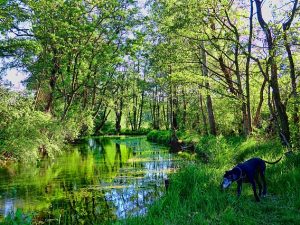


Mary Robinson grew up off-grid on an isolated smallholding in Warwickshire. Her first collection is The Art of Gardening (Flambard 2010). She won the Mirehouse/Words by the Water Poetry Prize in 2013 and the Second Light Poetry Prize (short poem category) in 2017. Her work includes two pamphlets, Uist Waulking Song and Out of Time, the latter to accompany a poetry/photography collaboration with Horatio Lawson, exhibited at Theatre by the Lake, Keswick in 2015. Her poems have appeared in several magazines including Poetry Review, The Yellow Nib, Stand, The North, Artemis, Envoi, The French Literary Review and Long Poem Magazine. Her sequence of alphabet poems will be published by Mariscat Press this year. She lives on the Llŷn Peninsula in North Wales. Her blog is:
Recollecting Water by Mary Robinson
Recollecting Water
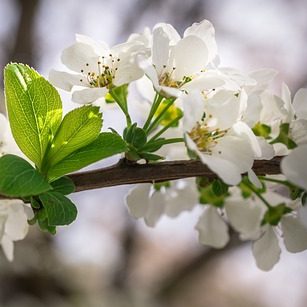
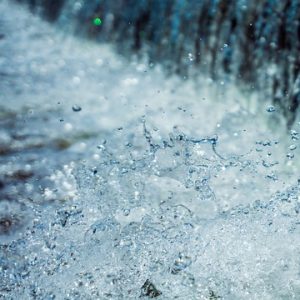


White noise pours from the earth –
a liquid meteor shower.
Meadowsweet almonds the air.
I crush watercress with gritty sandalled feet,
brambles snag my ankles and I know
there will be a scabbed tear of scar next day.
I splay my hand as a sieve – splashes
darken the threads of my cotton shirt,
smear beige streaks on earth-brown legs.
I’m doused with the spring’s strength
as its rainbow arc spurts to the stream
plashy with mint and rushes.
The flow forces the jug down,
water spills up and over before I can stop,
droplets poise on the rim.
I carry it back to the house,
curl one hand round the haft’s sharpness
and finger the scallop shapes engraved on the glass.
A pool of stillness lies at the table’s centre
as clear as the Waterford chandelier
above the staircase in the sisters’ house.
A miniature spring pours from the jug’s lip –
I taste sunlight so cold it stings my teeth
and scalds my throat.
I’ve kept the jug.
Mary Robinson
First published in The Art of Gardening (Flambard Press 2010)

Susan Taylor began writing in her teens in the idyllic setting of her family farm in the Lincolnshire Wolds – Tennyson country. An ex-shepherd, she has become rather a turncoat now, with much sympathy for the plight of the wild wolf. She has seven published poetry collections, including Temporal Bones, published by Oversteps Books in July 2106.
Susan is a keen performer of her poetry and has developed and toured many collaborative poetry shows, including La Loba – Enchanting the Wild and The Weather House, which appeared as an Indigo Dreams Poetry Pamphlet in 2017.
Stream by Susan Taylor
Stream
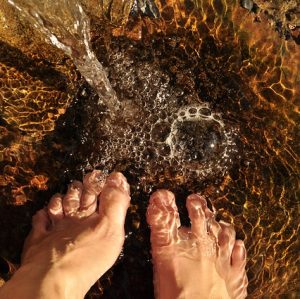
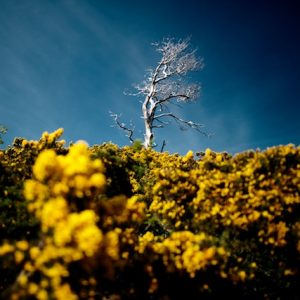
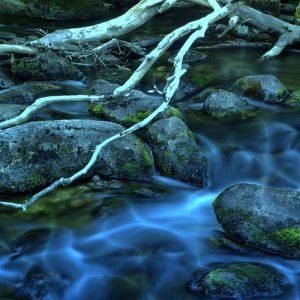
Every star over the moors was a trouble,
before it was speaking in light, the way stars do.
Every journey was meaningless dust, until
that moment the feet touched water and tingled.
Granite beneath us is restless in its core;
cooling, heating, repeating patterns of flux.
The old Dartmoor saying is true now
gorse is in flower and kissing’s in season,
while the stream closest to home
is singing the song of songs.
Susan Taylor
‘Stream’ was first published in ‘This Given’, a limited edition pamphlet by Paper Dart Press
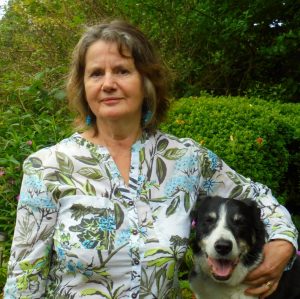
Kerry Darbishire, songwriter and poet, grew up in the Lake District where she continues to live, find inspiration and write in a wild area of Cumbria. Her poems have appeared widely in anthologies and magazines and have won or been listed in several competitions, including the Bridport shortlist 2017, and the 2018 PBS Mslexia Poetry Competition. Her first poetry collection, A Lift of Wings, was published in 2014 by Indigo Dreams. A biography, Kay’s Ark, the story of her mother, was published in 2016 by Handstand Press. www.handstandpress.net.
Her second poetry collection, Sweet on my Tongue, was published by Indigo Dreams in 2018 and is a finalist in the Cumbria Culture Awards 2019. She co-edited the new Handstand Press Cumbrian Poetry Anthology, This Place I know. Kerry is currently working on a pamphlet and a new full collection.
Letters from Home by Kerry Darbishire
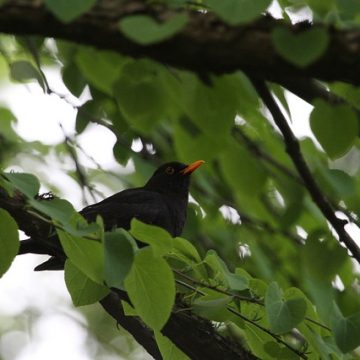
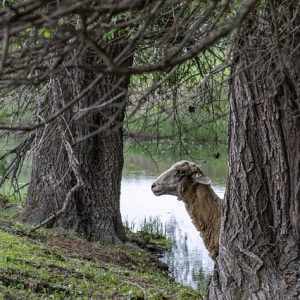
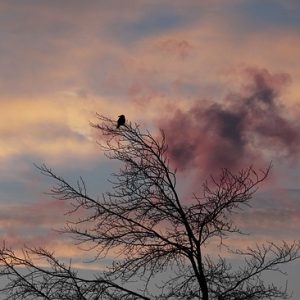
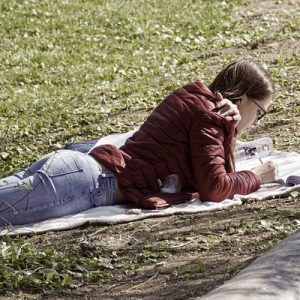
Letters from Home
It’s not your news
the willow-curve of your words
I wait for but the space
between the lines
clear taste
of the ghyll
her mouth-grey dawns squall
of blackbirds thrush and wren echoing
the leaf-scorched beck
her rain-on-rain September song
thrum of hooves
to shearing dipping cries of separation
banks of primrose violets lizards
storing summer warmth
the pause
between dappled shade and tiny
dusty throats swallowing the moon
in love with her own gaze her promise
to return on dead fern days
that northern light
falling between the lines
like winter from the sky
Kerry Darbishire


Alun Robert was born in Scotland of Irish ancestry. He is a prolific creator of lyrical verse. Of late, he has achieved success in poetry competitions and featured in international literary magazines, anthologies and on the web.
After Roger Deakin by Alun Robert
After Roger Deakin
Roger Stuart Deakin (1943-2006) writer and environmentalist
credited as founder of the English wild swimming movement

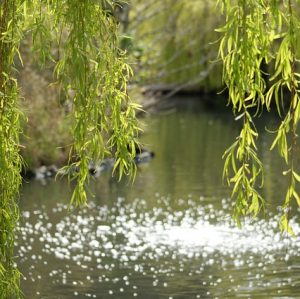
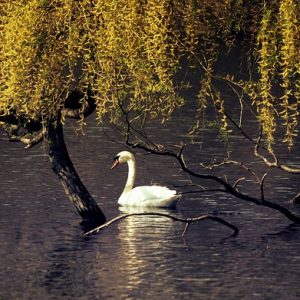
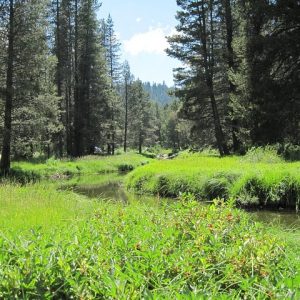
Going against the flow
Eyes straight ahead
Skimming on the surface
Like whirligig beetles
Gulping for breath
Mouth spitting water
That’s hardly saline
Though far from pure. But
Colder than ambient
Particularly under willow
Guarding from the banks
Like soldiers of honour
Avoiding native crayfish,
Gold-ring dragon larvae,
Stoneflies and above
Skirting mayfly. While
Reeds up the nostrils
Mixing with mucus
Coughing and spluttering
Every so often with
Knees knocking pebbles,
Rocks, dead branches,
Effluent of mankind
Dumped in the creek. For
This may be springtime
And this is wild swimming
In the hinterland of England
Off the beaten track
Going against the flow
Eyes straight ahead
Swimming in a stream
Never out of depth.
Alun Robert

Formerly an actress, Kate Firth is a voice coach based in Barcelona. She has had poems published in various anthologies and magazines. Passionate about poetry as an oral as well as written tradition, she has performed at Bristol, Cheltenham and Winchester poetry festivals.
Crackington Haven on New Year’s Eve by Kate Firth
Crackington Haven on New Year’s Eve
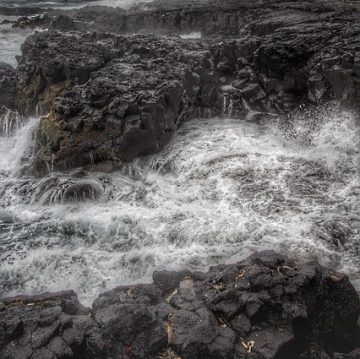
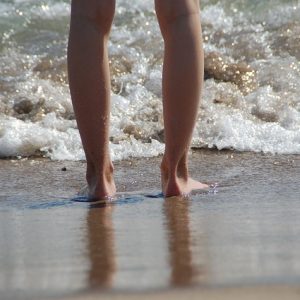
At the twist of the year, watching the whirl
of the world on the cliffs, a chaos of waves
flail in the sky, as the heavens weave
pearly curls of ivory. This storm
is skirring your ragged December
through pebbles between your feet. Bubbling
suds creep to your ankles, the ooze
sucking the scum of your failures
back to the source. From the brook by the bridge,
fresh water pumps up in funnels
to skitter a river into the salt. Watching
this meeting of waters and ferment,
you ponder the froth unable to fathom
the moment the stream stops being a stream
and succumbs to a vastness of sea.
Kate Firth
Previously published in Poems for a Liminal Age, Sentinel Publishing
(Ed. Mandy Pannett, SPM Publications, 2015)
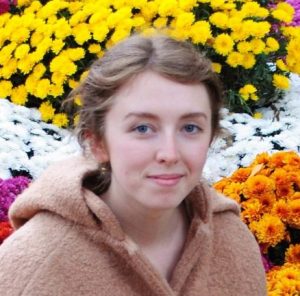
Rebecca Parker is based on the coast of Fife, Scotland. Her work has most recently appeared in Gutter, The Curlew, and online at The Poetry Village. She is a member of the publishing team at Tapsalteerie.
Elements by Rebecca Parker
Elements
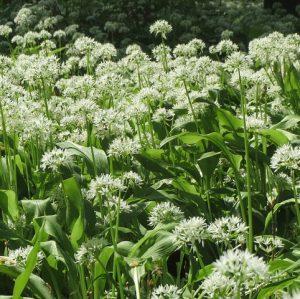
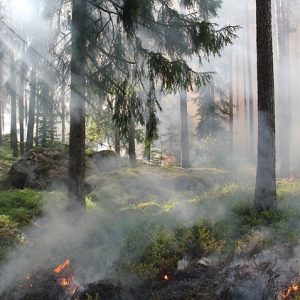
See that day we found a forest fire
roasting the ramsons, that sizzling garlic smell
all down the path and my back baking
in the crackling sun while the bracken
crisped and snapped, and melted your shoes
as you stamped
And even the flames withered
mercifully on the hillside, like they too were
wrung out, drained, extinguished by this heat
And,
in the shade of the canopy meeting the sheer glen side,
an ancient feeling as I sat on the pebble bed, smoke
in my hair, hearing a dreamy hiss and pop of embers
doused
The water gurgling through my toes; ash floating down the burn.
Rebecca Parker

Formerly an actress, Kate Firth is a voice coach based in Barcelona. She has had poems published in various anthologies and magazines. Passionate about poetry as an oral as well as written tradition, she has performed at Bristol, Cheltenham and Winchester poetry festivals.
The Yew Speaks On St Brigid’s Day by Kate Firth
The Yew Speaks On St Brigid’s Day
out-striding the storm
you step
under a fallen beech
bridging
two ridges in the gorge
over
a stream flowing from flooded field
to quagmire in the wood; rain water
stripping mud
from the stones
you stop
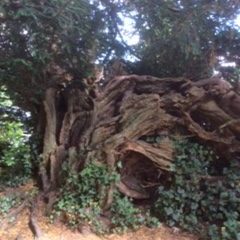
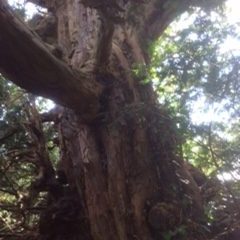
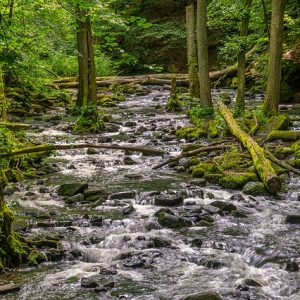
between its branches
an ancient yew holds open a hollow
-into this gap-
–you whisper a wish
half trusting heartwood
to soak up your hope with its sap
the crumpled face
in this thousand year trunk
turns
and tells you its blessing
– a shift and stretch in the season
the tug
of thin sun
to an invisible swelling of green
Kate Firth
Crackington Haven on New Year’s Eve by Kate Firth

S.A. Leavesley is an award-winning poet, fiction writer and journalist. Overton Poetry Prize winner 2015, her latest titles include How to Grow Matches (Against the Grain Press) and plenty-fish (Nine Arches Press). She has been published by the Financial Times and The Guardian, on Worcestershire buses and in the Blackpool Illuminations. An occasional climber and surfer, she loves swimming, cycling, walking and being outdoors.
The Disappearing River, Stream, Trickle by S. A. Leavesley
The Disappearing River,
Stream,
Trickle
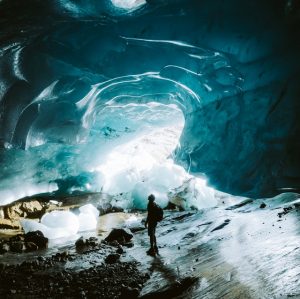
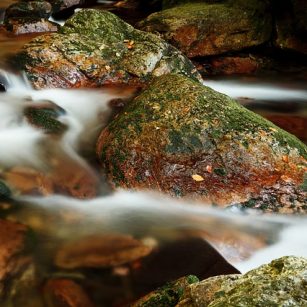
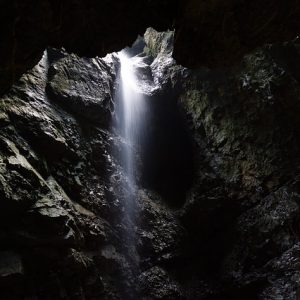
Where is the door
that opens to song,
the hidden source
that holds its notes alive,
the long tune that floats clear
through chill-&-thirst-struck stone?
I choke on its sudden burst, its rock-
jump, swelling spill-over.
Silence is the hole that waits, a falling
closed of mouth & heart, the ghost
trace of water’s slow-fast-slow
ongoing passage onwards past.
When the song’s flow is gone,
memory’s wet touch leaps on.
S. A. Leavesley
Note: This was initially inspired by the River Alyn, a tributary of the River Dee. As a small river running through a limestone gorge, large volumes of water are lost down sinkholes in the summer.
A Planet Where by S. A. Leavesley
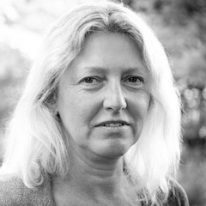
Alison Lock writes poetry, short fiction and creative non-fiction. She is the author of two short story collections, three collections of poetry, and a novella, as well as contributing to several anthologies. Her short fiction has won/been listed in a number of competitions – The London Magazine, The Sentinel Literary Quarterly, The Tillie Olsen Award, The Carve Esoteric Prize. She has an MA in Literature Studies from York St John University. Her work focuses on the relationship of humans and the environment, connecting an inner world with an exploration of land and sea, a love of nature, through poetry and prose.
By the River Dwyfor by Alison Lock
By the River Dwyfor
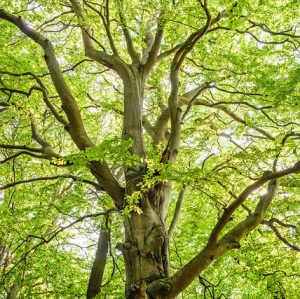
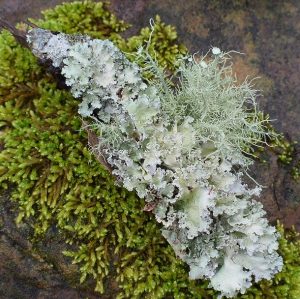
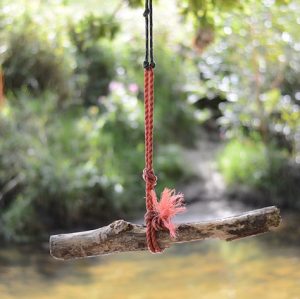
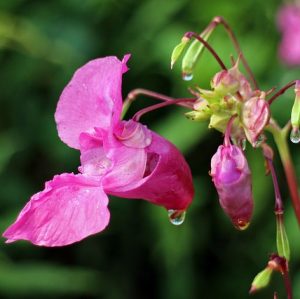
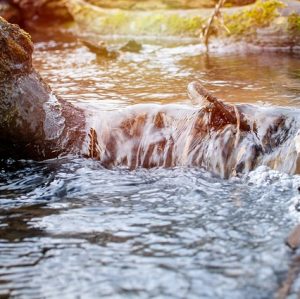
Under the great umbrella of a beech tree, the river shillies around rocks
while they resist the force of the current. Some are boulders, sturdy, unyielding,
others are dry, moss-covered, but all are as damp as the slip-grey sky.
Around me the air sings, the wind carries its song in a lullaby.
I rest at the feet of the great trunk – all its years of growth, pock-marked
by the seasons, challenged by lichen and other extraordinary growths.
Above, the leaves criss-cross each other, not quite touching, allowing space
for the air to filter, opening a multitude of crevices for the sky to enter.
Air, water, leaf, all meet at a place that is neither surface nor place, unowned by all.
A rope hangs from a branch, knotted at the end, slung from a strong limb, ready
to swing across the river in a child’s leap. Ivy graces the rocks on the bank
where the moss-cladding is deep and green and velvet.
Himalayan Balsam sways its sex, opening to the damp air.
On the far bank, the brambles etch their shapes, stretching their thorny feelers.
A moment of sun breaks through the cloud and the colours change; the water
is quick-bright, magnifying the stony bed, catching the tails of ghost-minnows
darting in and out of the shallows.
Leaves, grass, a ricketty fence, all choose new colours from an artist’s pallet.
The water downstream is feather-white as it leaps over the rocks, and an ash tree
waves its flags looking as if it will take-off, each leaf buffeting
one against the other, jostling, vying for a glimpse of the sun.
A tiny black and red winged creature, searches the length of my trouser leg.
My boots crunch on the sprinkling of beechmast on the ground around the tree.
With my back against the trunk of the beech I meld into the roots – my nest
of numbness as my human bones are flesh deep in tree and river and rock.
Alison Lock


